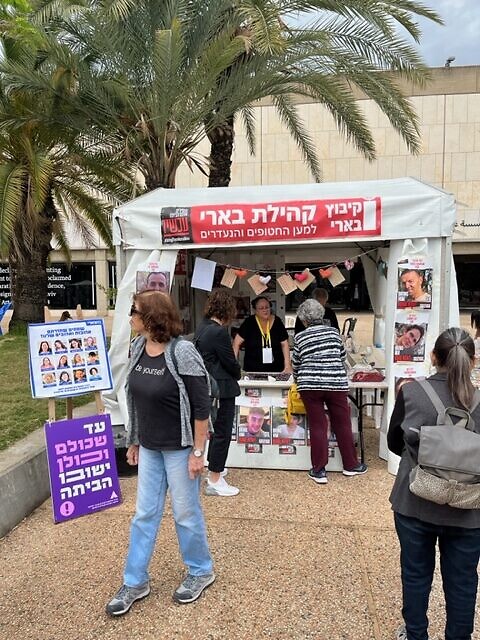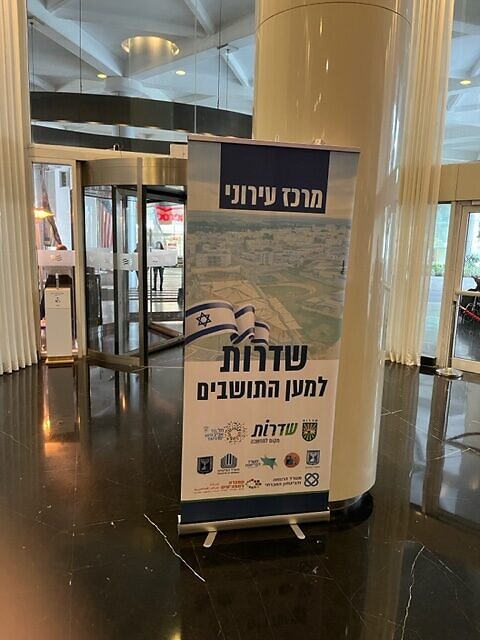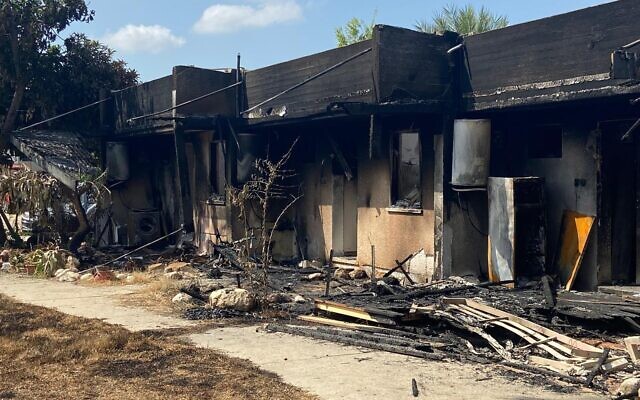SPECIAL REPORT: ‘Israel can never go back to the way it was before’
The events of 7 October left anger, confusion and doubt in the wake of a preventable intelligence and military failure, writes Richard Miron
Ilanit Suissa stands amid a nightmare in the place that was once home to her dreams.
Around her is a scene of destruction, shards of glass alongside lumps of concrete, ashes and destroyed buildings. This is Kibbutz Kfar Aza, once home to 800 people, now a crime scene. On 7 October, Hamas rampaged into the settlement, killing 62 people and taking 18 captive.
“My heart is not just broken because of the Holocaust that took place here, but also because my whole agenda and ideology has broken down. I don’t know what to believe any more,” Suissa says.
She has come back with her partner Chezi for the first time since the massacre to gather a few items including a book and a keepsake for her 13-year-old daughter from her now deserted home.
“I really believed in peace, I was one of the people who fought for it,” she says on the verge of tears. As a writer and filmmaker, she described the lives of the Gazans just beyond the border fence that was smashed during the Hamas attack.

Like many kibbutzniks around Gaza, she identified with the left in Israel, what was called the “peace camp”. All that changed amid the horror of 7 October.
On the day Hamas stormed into the kibbutz killing and abducting all they could find, Suissa sheltered in her safe room with Chezi, her mother and daughter. The gunmen didn’t attack her home but many neighbours were murdered as they hid.
For her, it is not just Hamas that stands guilty. She also blames ordinary Palestinians – “I can’t imagine I will ever speak to someone from Gaza. Unfortunately, I feel every one of them had a part of what happened.”
Men from Gaza used to come to the kibbutz to work, returning home at the end of the day. Evidence gathered by the Israeli army and police suggests some took the opportunity to gather information for Hamas, from the layout of homes to entry codes for the kindergartens.
Suissa is far from alone in reassessing her thoughts and beliefs. The lives of millions of Israelis have been forever transformed by 7 October.
I have been visiting Israel for more than 40 years and spent 11 years living in the country. But to go there now is to experience a different place, one that is permeated with anger, confusion and doubt.
Most Israelis are still struggling to understand the scale of the intelligence and military failure that allowed some 3,000 armed men to break through the country’s much-vaunted defences and rampage freely for hours before any organised military response was taken.
Kfar Aza and other communities were simply abandoned by those who were meant to protect them.

MILITARY DISORDER
A recently retired senior military figure spoke to me of the collapse not just of the physical defences but of the military and strategic doctrines that underpinned Israel’s approach to Gaza. Like many, he is bewildered and shocked by the extent of Israel’s failure on that day.
He had no clear answers about how it could have happened, only saying the security establishment was in the “initial phase of understanding” what went wrong and why – little comfort to those whose loved ones were killed or taken hostage.
Warnings of suspicious activity in Gaza before 7 October were ignored. Female soldiers acting as spotters on the border repeatedly reported concerns of unusual movements and exercises by Hamas near the fence. Politicians and security officials dismissed them – they didn’t align with the prescribed thinking that Hamas was contained, and not a threat.
Michael Milshtein was one who spoke out to the contrary. Now an academic, he previously headed the Department of Palestinian Affairs in Israeli Army Intelligence.
He insisted Hamas was wedded to its jihadist roots and was planning to strike Israel. His surprise, he says, was not that the attack occurred but rather the scale and level of brutality.
“The world that existed until 7 October has changed,” he says – “it has exploded the considerations of everyone in the military and politics.” As he explains, for the political left this means the notion of two peoples living in harmony as good neighbours in two states has gone.
Suissa is far from alone in reassessing her thoughts and beliefs. The lives of millions of Israelis have been forever transformed by 7 October.
The new consensus Milshtein describes is of separation from the Palestinians, a scenario in which they would gain some form of limited independence built around Israel’s security requirements rather than Palestinian aspirations. This would mean a demilitarised entity with Israel controlling all external borders and complete separation; something considerably less than the Palestinians have demanded.
Milshtein equally insists recent events have destroyed the ideas that underpin the Israeli right. Its national religious ideology aspires to hold on to the West Bank and build ever more settlements on land that is home to two and a half million Palestinians.
“We and the Palestinians can’t live in one entity,’ he says, “ninety-five percent of Israel reject that idea.”
Milshtein and other military experts now speak of a “divorce” and a physical division between Israelis and Palestinians on the ground, living on separate sides of a border.
TEARING UP THE OLD POLITICAL MAP
Within Israeli itself there is visceral anger among many I met from all parts of society: religious, secular, Ashkenazi, Sephardi, rich and poor.
Much of it is directed toward one man, Benjamin Netanyahu, Israel’s self-proclaimed Mr Security and the country’s longest serving prime minister. He has refused to take responsibility for what happened on 7 October and even as the army was fighting in Gaza sought to shift the blame on to the security establishment. His evasiveness has only increased the fury felt by many towards him.
Those who know Bibi up close say he will do everything he can to remain in office. “He won’t go willingly,’ says Nachman Shai, a former government minister and member of the Knesset for the Labour Party and the now-defunct Kadima Party.
Shai has sat across from Netanyahu for years in the Knesset and is damning about the prime minister and the responsibility he bears for what has happened to the country not just in the past two months but over the past few years.
“Israel was not united, Israel was not capable,” he says.
Shai recalls what was going on before 7 October. The country was bitterly divided with mass protests as Netanyahu tried to force through a “reform” of the judicial system.
This initiative for institutional change was in fact a clumsy attempt by the prime minister to concentrate power in his hands and limit the independence of the judiciary as he faced a trial on corruption charges, he says.
During the months of protests, pilots and many military reservists began in increasing numbers to refuse to serve, saying Netanyahu’s planned “reforms” were a deliberate attempt to destroy Israeli democracy.
The chief of staff of the army warned the prime minister of the harm being done to military preparedness. Netanyahu not only dismissed these concerns but also refused to meet the chief in person as the urgency grew.
Sitting in a café near his home a few miles west of Jerusalem, Shai considers what this means for the country and his own political camp.
‘The Labour Party is dying’, he says – its leader, Merav Michaeli, has recently announced she intends to leave politics and for there to be a “new start”.
As Shai ponders the future of his once political home, a former local Labour activist approaches to discuss who might replace Netanyahu if and when he is forced from power. No mention is made of any figure from the Left to which they both belong. Shai knows the political map of old has disappeared in the ashes of 7 October 7. For him this is not necessarily a bad thing.
“I hope every aspect of Israeli life is changed. Not just politics, but also the military, our social structure, education, the constitution, the situation of Israeli Arabs and Druze citizens.”
BACK TO BASICS FOR THE FUTURE
His sentiments find echoes on the streets of Tel Aviv, where pictures of the remaining hostages held in Gaza plaster walls and lampposts. Huge electronic billboards line the main highway through the city calling for the hostages to be returned and declaring “United – we will win”.
But behind the slogans sits real pain and concern for the future. Chanan Lachs has come from his home outside Tel Aviv to support the families of the hostages who are maintaining a vigil in front of the city’s main museum.
In the concrete plaza are signs of the different communities struck on 7 October; Be’eri, Nahal Oz and many others. People mill about, looking at the pictures of those abducted and the empty places laid for every one of them at a long dining table.
Lachs talks of the personal importance of seeing the hostages freed, recalling his father who spent ten months in captivity in Egypt after the War of Independence in 1948.
Lach’s words are choked with tears as he talks about his family, who survived the Holocaust and made their way to Israel and his pride in his daughter now serving in the army.
His voice clears as he declares: “The past few years we have had a leadership that has violated the contract with the people and Zionism. I very much hope this crisis will bring us renewal and real Zionism.”
The course of the war being fought in Gaza will dictate for Israel what comes next, both in contending with the external threats to the country and the internal challenges.
But whatever happens there is a difficult and painful path ahead to an unknown destination and only one certainty – Israel will never go back to the way it was before 7 October.
Richard Miron is the CEO and Founder, Earshot Strategies

Thank you for helping to make Jewish News the leading source of news and opinion for the UK Jewish community. Today we're asking for your invaluable help to continue putting our community first in everything we do.
For as little as £5 a month you can help sustain the vital work we do in celebrating and standing up for Jewish life in Britain.
Jewish News holds our community together and keeps us connected. Like a synagogue, it’s where people turn to feel part of something bigger. It also proudly shows the rest of Britain the vibrancy and rich culture of modern Jewish life.
You can make a quick and easy one-off or monthly contribution of £5, £10, £20 or any other sum you’re comfortable with.
100% of your donation will help us continue celebrating our community, in all its dynamic diversity...
Engaging
Being a community platform means so much more than producing a newspaper and website. One of our proudest roles is media partnering with our invaluable charities to amplify the outstanding work they do to help us all.
Celebrating
There’s no shortage of oys in the world but Jewish News takes every opportunity to celebrate the joys too, through projects like Night of Heroes, 40 Under 40 and other compelling countdowns that make the community kvell with pride.
Pioneering
In the first collaboration between media outlets from different faiths, Jewish News worked with British Muslim TV and Church Times to produce a list of young activists leading the way on interfaith understanding.
Campaigning
Royal Mail issued a stamp honouring Holocaust hero Sir Nicholas Winton after a Jewish News campaign attracted more than 100,000 backers. Jewish Newsalso produces special editions of the paper highlighting pressing issues including mental health and Holocaust remembrance.
Easy access
In an age when news is readily accessible, Jewish News provides high-quality content free online and offline, removing any financial barriers to connecting people.
Voice of our community to wider society
The Jewish News team regularly appears on TV, radio and on the pages of the national press to comment on stories about the Jewish community. Easy access to the paper on the streets of London also means Jewish News provides an invaluable window into the community for the country at large.
We hope you agree all this is worth preserving.






















